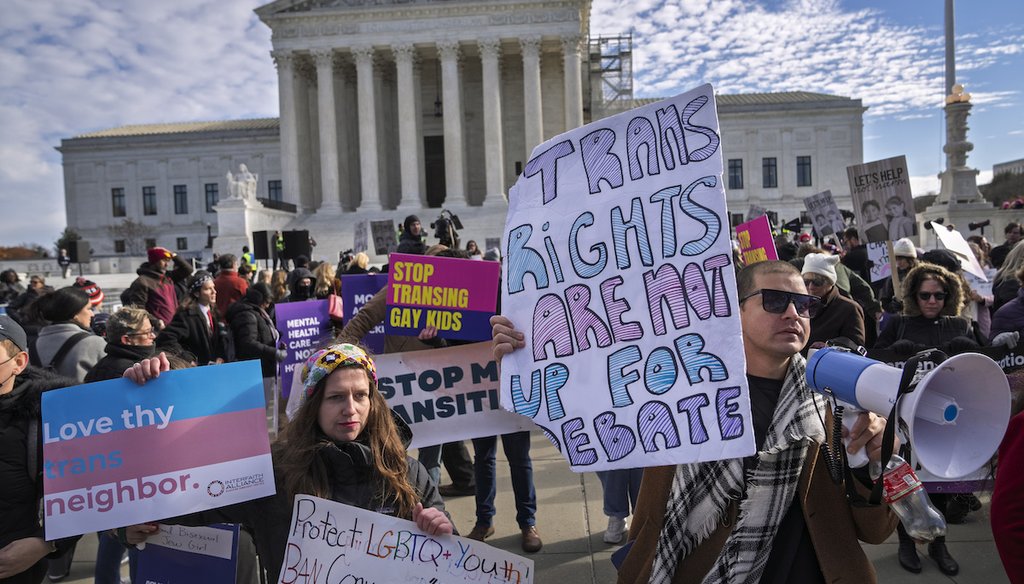Stand up for the facts!
Our only agenda is to publish the truth so you can be an informed participant in democracy.
We need your help.
I would like to contribute

Supporters of transgender rights rally by the Supreme Court, Dec. 4, 2024, in Washington, during oral arguments in a case regarding a Tenn. law banning gender-affirming medical care for transgender youth. Behind the two are people who support the ban.(AP)
If Your Time is short
-
Lawyers on either side of the case offered opposing characterizations of gender-affirming medical care, but its use in transgender adolescents has been studied and is supported by major medical organizations in the U.S.
-
Both justices and lawyers made claims about trans youth and suicide. Several studies have linked gender-affirming medical care to positive impacts on mental health, including one the defense cited.
-
The justices spent time reviewing Europe’s recent approach to trans health care. Although some countries have introduced new restrictions or narrower guidelines, they have not banned care as some U.S. states have.
WASHINGTON — After the Supreme Court adjourned oral arguments over Tennessee's gender-affirming care ban, a teen emerged from the columned courthouse sporting a lavender tie and stood quietly next to her parents, Brian and Samantha Williams.
To her right stood a large crowd decked out in rainbow flags. To her left stood another crowd warning of what they said were the dangers of gender-affirming medicine. "Stop transing gay kids," some of their signs read.
Sixteen-year-old L.W., one of the case’s plaintiffs, shivered in 30-degree temperatures as crowds, unaware of her presence, attempted to drown each other out with arguments about her right to access gender-affirming medical care — the question at the center of U.S. v. Skrmetti, the case L.W.’s family, and others, first brought against Tennessee. The family argues that the state’s ban on gender-affirming medical care for transgender youth is unconstitutional.
During the Dec. 4 oral arguments, the justices wrestled with complex legal issues, including whether the law treats people differently based on sex and if it merits a higher level of legal ‘scrutiny.’
Throughout the morning, justices and lawyers made warring claims about youth and gender-affirming medical care’s efficacy, safety and consensus.
Puberty blockers and hormones: Necessary for some minors? Or unproven?
Tennessee’s ban regulates the use of two types of medications — puberty blockers and hormone therapy when used for gender transition. But as the plaintiffs and defendants argued their sides, they painted very different pictures of what medical evidence shows about how these treatments work when minors use them.
Representing the plaintiffs, U.S. Solicitor General Elizabeth Prelogar told the court the evidence is "uniform" in showing that some minors need these medications.
"Whether you look at the standard of care, whether you look at the view of every major American medical association that has taken a position … it's reflected in the clinical practice, the nation's leading children's hospitals, for decades, have been providing this care," she said.
But when Tennessee’s solicitor general, Matt Rice, addressed the court, he described puberty blockers and hormones as "risky, unproven medical interventions."
What do we know about the puberty blockers and hormones and the evidence behind them?
Doctors have treated trans youth with these medications since the late 1990s, starting in the Netherlands. Since then, a growing body of research into the treatments’ risks and benefits has generally linked them to improvements in patient well-being and mental health, or have found no significant effect either way.
Major U.S. medical associations, including the Endocrine Society, the American Academy of Pediatrics and the World Professional Association of Transgender Health, have evaluated the current research and support access to gender-affirming medications. When prescribed, gender-affirming medications are overseen by the patient's medical team and require parental consent.
Published guidelines from these organizations outline the typical standard of care:
For patients not yet in puberty, care amounts to "social transition," which is often presented in the form of wearing new clothes or going by different pronouns or names.
After puberty’s onset, and after consulting mental health providers, doctors and parents, trans adolescents can be prescribed puberty blockers, which temporarily pause the body from producing the hormones that cause pubertal body changes. Once an adolescent stops taking them, puberty resumes.
Since the 1980s, doctors have prescribed and studied puberty blockers for kids who start puberty too young, known as precocious puberty.
Medical guidelines say older adolescents can be prescribed hormones like testosterone and estrogen that cause body changes — some reversible, others not — that allow teenagers’ bodies to develop in line with their gender identities. Extended hormone use can impact long-term fertility — but not always. The use of cross-sex hormones by trans adolescents has generally shown positive or neutral effects on mental health and well-being.
Gender-affirming surgery in patients younger than 18 is very uncommon, especially "bottom surgeries" that alter genitalia.
Despite decades of puberty blocker and hormone use, the sample sizes in these studies are limited partly because the numbers of transgender youth are very small compared with the general population.
Read more:
- Is all gender-affirming care for children ‘experimental’? Experts say no
- Puberty blockers: The facts and the myths
- Fact-checking 3 claims in Tucker Carlson’s show on trans health care
What we know about suicide and gender-affirming care
The oral arguments also focused on gender-affirming medical care’s effect on mental health, particularly suicide.
"Some children suffer incredibly with gender dysphoria, don't they?" asked Justice Sonia Sotomayor, one of the court’s three liberal-leaning members.
"Yes, it's a very serious medical condition," Prelogar responded.
"Some attempt suicide?" Sotomayor asked.
"Yes, the rates of suicide are striking and it's a vulnerable population," Prelogar said.
In 2023, The Trevor Project, a nonprofit focused on LGBTQ+ suicide prevention, found in a survey of over 28,000 youth that "41% of LGBTQ young people seriously considered attempting suicide in the past year," with rates higher for transgender youth.
Numerous studies have found a positive link between access to gender-affirming care and improved mental health for young people experiencing gender dysphoria.
In 2022, Dr. Jack Turban, assistant professor of child and adolescent psychiatry at the University of California San Francisco, cataloged for Psychology Today 16 studies that examined mental health and gender-affirming care.
Thirteen of them showed an association between better mental health and access to gender-affirming care, including puberty blockers and hormone treatment. The studies showed fewer instances of suicidal thoughts and lower rates of depression among those who received care. The other three studies did not find statistically significant results.
Nonmedical interventions such as the use of a preferred name were also associated with decreases in suicidal behavior and depression. According to The Trevor Project’s 2022 survey of more than 16,000 transgender and nonbinary youth, supportive families, schools and communities also were associated with lower instances of suicidal thoughts and attempts.
But Rice argued that suicidality could be worsened by gender-affirming medical care. He specifically pointed the justices to defense filings that referred to a 2020 study that looked at 148 patients ages 9 to 18 who were receiving gender-affirming medical care in Dallas, Texas. It included mixed results on suicidality depending on whether post-treatment behaviors were compared with instances of suicidality over a lifetime (lower after treatment) or compared with instances in the months before treatment (slightly higher).
But the study’s overall conclusion said its "results provide further evidence of the critical role of gender-affirming hormone therapy in reducing body dissatisfaction. Modest initial improvements in mental health were also evident."
Read more:
- Gender affirmation is linked to improved mental health. There’s no evidence it drives youth suicide.
- ‘Gender dysphoria’: What it is, what it isn’t and how history has changed its view
- Vivek Ramaswamy got it wrong; being trans isn’t a mental health disorder.
How are European nations changing gender-affirming care policies?
The defense spent some time talking about steps some European countries have taken to adopt more stringent regulations around access to gender-affirming medical care.
"Half of the States, Sweden, Finland and the UK, all now restrict the use of these interventions in minors and recognize the uncertainty surrounding their use" Rice said.
Some European countries have recently restricted access to gender-affirming medical care, most notably in the U.K. where the nation’s health service and government have stopped providing puberty blockers to trans youth, except for in research. Hormones are only available to trans youth after they turn 16.
In 2020, Finland’s Council for Choices in Health Care, which issues recommendations to the government’s Ministry of Social Affairs and Health, released guidelines prioritizing psychotherapy and stating that puberty suppression should be administered on a "case-by-case basis after careful consideration."
In national guidelines updated in 2022, Swedish health officials cautioned that "the risks of puberty blockers and gender-affirming treatment are likely to outweigh the expected benefits." The guidelines recommended limiting use of puberty blockers, hormones and mastectomies to "exceptional cases."
But the restrictions in Finland and Sweden are not "bans" and allow doctors to use medical judgment in prescribing medications.
"The other jurisdictions that my friends point to," said Prelogar, "have not banned this care, and I think that's because of the recognition that this care can provide critical, sometimes lifesaving benefits for individuals with severe gender dysphoria."
The policy changes aren’t universal. Gender-affirming medications are still available in many countries across Europe.
Read more:
Our Sources
Sources linked in story.




























